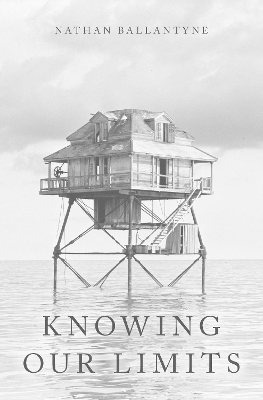
Knowing Our Limits
Oxford University Press Inc (Verlag)
978-0-19-084728-9 (ISBN)
Nathan Ballantyne defends the indispensable role of epistemology in tackling these issues. For early modern philosophers, the point of reflecting on inquiry was to understand how our beliefs are often distorted by prejudice and self-interest, and to improve the foundations of human knowledge. Ballantyne seeks to recover and modernize this classical tradition by vigorously defending an interdisciplinary approach to epistemology, blending philosophical theorizing with insights from the social and cognitive sciences.
Many of us need tools to help us think more circumspectly about our controversial views. Ballantyne develops a method for distinguishing between our reasonable and unreasonable opinions, in light of evidence about bias, information overload, and rival experts. This method guides us to greater intellectual openness--in the spirit of skeptics from Socrates to Montaigne to Bertrand Russell--making us more inclined to admit that sometimes we don't have the right answers. With vibrant prose and fascinating examples from science and history, Ballantyne shows how epistemology can help us know our limits.
Nathan Ballantyne received his Ph.D. in Philosophy from the University of Arizona and his B.A. (Hon) in Philosophy from Victoria College in the University of Toronto. He has published widely on contemporary epistemology in journals such as Mind, Philosophy and Phenomenological Research, and Philosophical Quarterly. He is Executive Editor of the Canadian Journal of Philosophy and is co-editor with David Dunning of Reason, Bias, and Inquiry: New Perspectives from the Crossroads of Epistemology and Psychology (Oxford University Press, forthcoming).
Chapter 1: Epistemology and Inquiry
Chapter 2: Regulative Epistemology in the Seventeenth Century
Chapter 3: How do Epistemic Principles Guide?
Chapter 4: How to Know Our Limits
Chapter 5: Disagreement and Debunking
Chapter 6: Counterfactual Interlocutors
Chapter 7: Unpossessed Evidence
Chapter 8: Epistemic Trespassing
Chapter 9: Novices and Expert Disagreement
Chapter 10: Self-Defeat?
Chapter 11: The End of Inquiry
Bibliography
| Erscheinungsdatum | 25.09.2019 |
|---|---|
| Verlagsort | New York |
| Sprache | englisch |
| Maße | 236 x 160 mm |
| Gewicht | 612 g |
| Themenwelt | Geisteswissenschaften ► Philosophie ► Erkenntnistheorie / Wissenschaftstheorie |
| Geisteswissenschaften ► Philosophie ► Ethik | |
| ISBN-10 | 0-19-084728-X / 019084728X |
| ISBN-13 | 978-0-19-084728-9 / 9780190847289 |
| Zustand | Neuware |
| Informationen gemäß Produktsicherheitsverordnung (GPSR) | |
| Haben Sie eine Frage zum Produkt? |
aus dem Bereich

![Was heißt Denken?. Vorlesung Wintersemester 1951/52. [Was bedeutet das alles?] - Martin Heidegger](/media/113619842)
